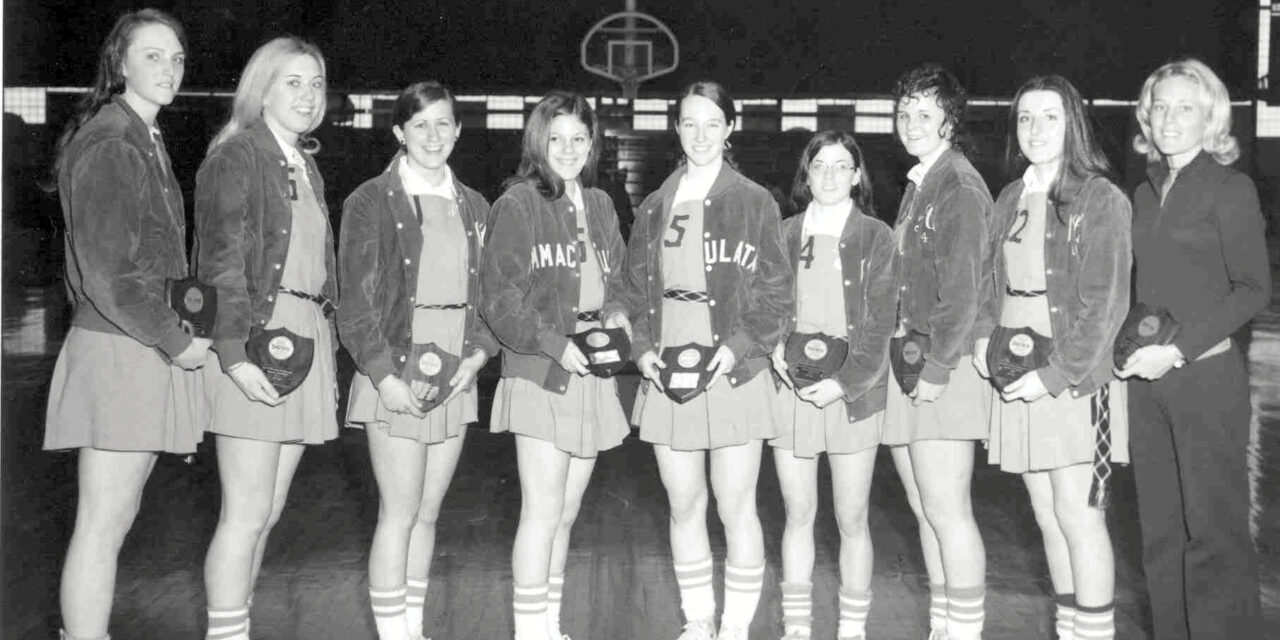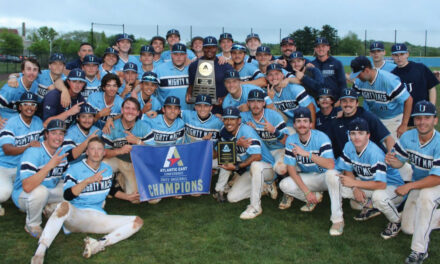“There is a special bond among this great group of women.”
If you’re an alum, chances are you are familiar with the story of the championship Mighty Macs. You may have seen the movie based on the Cinderella story of the women’s basketball team from Immaculata.
But when we tell you that they won their first championship 50 years ago—on March 19, 1972, you may be surprised, even shocked! How could it be 50 years since the Mighty Macs elevated women’s collegiate basketball with the first of three consecutive championships?
Well, we asked the players this same question.
“As far as seeming like it was 50 years ago, it doesn’t. We, as a team, have maintained good contact through the years and have had many opportunities to look back on all the fun we had together while at the same time achieving success on the court,” Denise Conway Crawford ’74 said. “There is a special bond among this great group of women.”
That sentiment seems to be unanimous among the players. Sue O’Grady ’72 said, “When Cathy [Rush, the coach] and the players get together, we start reminiscing, and it seems like it was just a few years ago. However, when I really think about what we didn’t have, as a basketball team, it seems like ancient history compared to today’s women’s sports.”
Judy Martelli ’75, states, “No, it doesn’t seem like 50 years. When you stop and imagine 50 years, it feels like a very long time. There are some memories that have faded, but there are many that are still vivid. The championships feel like they were yesterday. I feel blessed to have such fond memories.”
Watch this tribute video in honor of their anniversary.
Reflecting on Title IX
It’s fitting that Immaculata’s first championship coincides with the establishment of Title IX, one of the main goals of which was to promote gender equality. In 1972, President Richard Nixon signed Title IX of the Education Amendments of 1972 into law. The federal law states, “No person in the United States shall, on the basis of sex, be excluded from participation in, be denied the benefits of, or be subjected to discrimination under any education program or activity receiving Federal financial assistance.”
Without the passage of Title IX, there would not have been a women’s national championship tournament for the Mighty Macs to win. However, it’s commonly perceived that Title IX ended the party at Immaculata, because other bigger universities began to spend large sums of money on their up-until-then forgotten women’s sports teams. However, the real party was just beginning for women.
Larger schools began attracting female athletes with scholarships, which did not benefit Immaculata directly. Immaculata now competes in the NCAA Division III, which does not offer athletic scholarships. However, the significance and impact of Title IX can still be felt today.
Theresa Grentz ’74, who is being inducted into the Naismith Basketball Hall of Fame in September for helping the Mighty Macs win three titles, notes that Immaculata was an all-women’s college when Title IX was signed into law, so it had little impact on the school. Title IX really helped women at co-educational colleges and universities who offered few or no intercollegiate teams for women. “It changed the whole landscape of women’s college basketball and athletics as we knew it prior to Title IX,” Grentz adds. “This was very obvious to me when I became the first full-time head coach of women’s basketball at Rutgers University in 1976.”
“Title IX was such a monumental step in opening doors for women in the sports world. We’ve seen over the past 50 years how many women have had the opportunity to compete at high levels with perks they never would have had before Title IX,” said Denise Crawford, who was a member of all three championship teams. “It was long overdue, and we’re happy to know it’s in existence.”

PICTURED: Members from all three national championship teams reunited at Immaculata to celebrate the 50th anniversary of the first national title.Pictured L to R, front row: Cathy Rush, Marianne Stanley, Janet Young, Sue O’Grady, Denise Crawford, Patty Loughran and Marie Williams. Pictured L to R, back row: Theresa Grentz and Betty Ann Quinn; Not pictured: Janet Boltz, Barbara Kelly, Tina Krah, Judy Martelli, Maureen Stuhlman.
On March 18, 2022, the day before the 50th anniversary of the Mighty Macs’ first national title, Forbes.com posted a story, “In Celebrating the 50th Anniversary of Title IX, Start with the ‘Mighty Macs.’” The writer decries ongoing inequalities in sports and uses last year’s NCAA Basketball Tournaments as a prime example. “It frustrates today’s coaches, players and fans why the game continues to be viewed as ‘less than’ the men’s: from the facilities and travel; to food, lodging and coach’s compensation, women’s basketball has made some progress, but not nearly enough.”
Sue O’Grady, who played on the first national championship team, agrees. “Looking back on the changes that have occurred since Title IX was passed, I can see many changes that have been positive. However, as last year’s Final Four showed, in the inequality of what the men’s and women’s teams had access to, it is obvious that Title IX was, and is still, necessary.”
Few have done more for gender equality in coaching than former Mighty Mac point guard, Marianne Stanley ’76, who will also be inducted into the Naismith Basketball Hall of Fame in September. She famously filed an $8 million federal Title IX lawsuit against her employer, University of Southern California, for sex discrimination because she asked for her pay to match the men’s basketball coach and was ultimately replaced. Although Stanley lost the case, she eventually returned to college coaching for the University of California, Berkeley and was paid the same base salary as the men’s basketball head coach.
In other encouraging news, statistics show that more money is pouring into women’s sports and to paying women athletes than at any time in history.
Progress!
But should women have to wait another 50 years to completely catch up to the guys? Let’s hope not.





